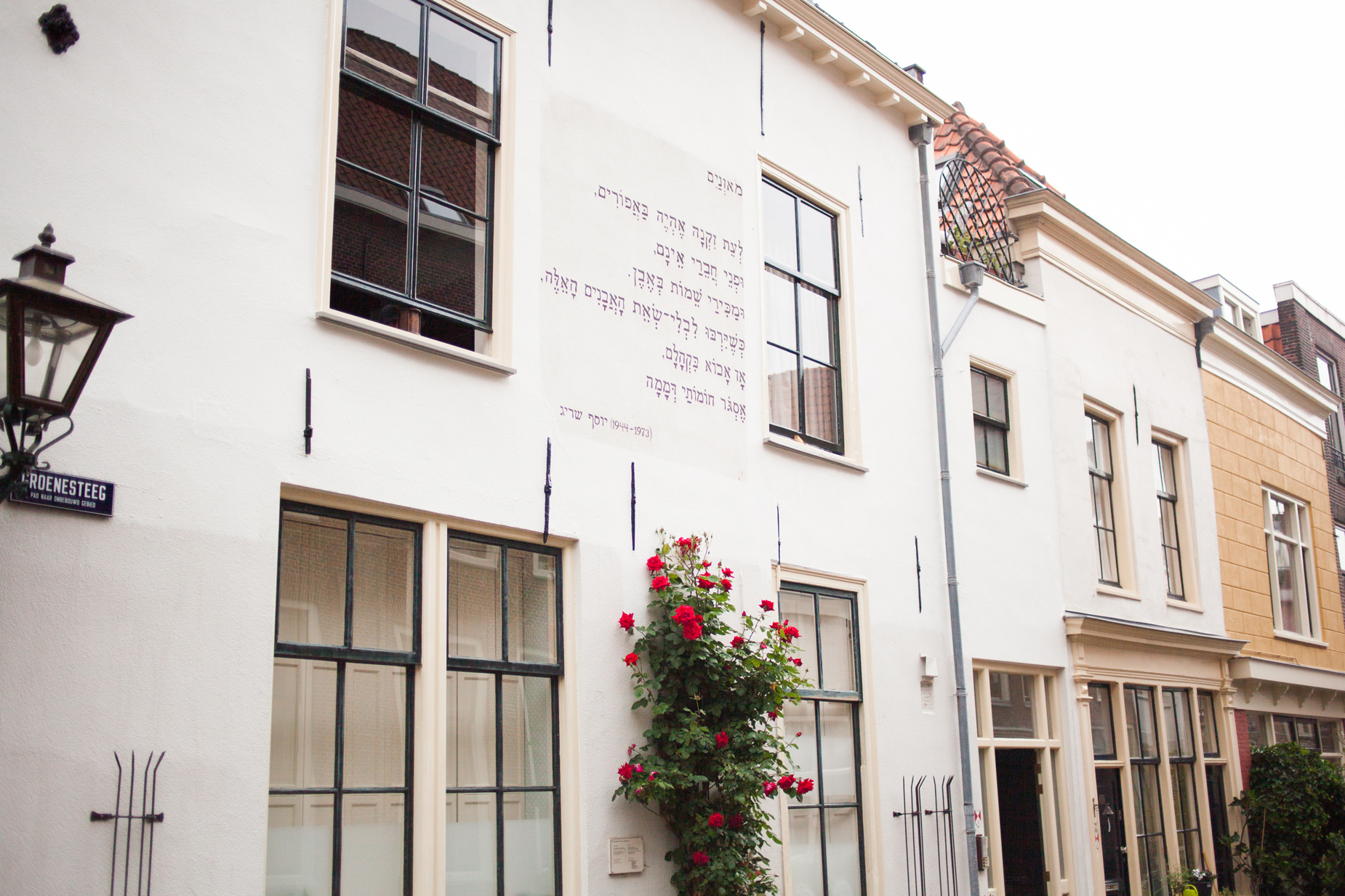Weegschaal
In mijn ouderdom zal ik in het grijs gaan,
als de gezichten van mijn vrienden er niet meer zijn,
en mijn bekenden - namen op steen.
En als deze stenen ondragelijk veel zullen zijn,
dan zal ik me bij hun gezelschap voegen,
en stil mijn muren sluiten.
Vertaling: Albert van der Heide
Are you a native speaker of Hebrew and would you like to recite this poem? Please contact us at muurgedichten@taalmuseum.nl!
This poem in 60 seconds
What to do when your friends and acquaintances disappear one by one and the only thing that remains are their gravestones? Yosef Sarig, a young man, pictures the time he will silently join them. Unfortunately, this never came to pass, as he died at the age of 29.
Want to know more? On this website you can listen to the poem, discover its origins and its author and find out what the poem means to the people of Leiden.
Josef Sarig
1944 - 1973
Yosef Sarig was born in the kibbutz of Beit HaShita in the Jezreel Valley, about 30 kilometers from Nazareth. In the Six Day War (1967), he served in the Israeli military. After the war, he studied music, which was one of his greatest passions besides poetry. Sarig taught music, composed, and organized choir and orchestra performances. He married and had two children.
Death
When in 1973 when Israel was attacked by Egypt and Syria, it meant the start of the Yom Kippur war. Sarig was drafted into the army again and was assigned chief of a tank unit on the Golan Heights. He was killed on the fifth day of the war 10 October 1973. He was 29 years old and a promising musician and poet.
Legacy
In Israel, Sarig is most known for his songs, for which he wrote the melody and lyrics himself. His song Light and Jerusalem (אור וירושליים) is known nationwide and can occasionally still be heard on the radio. The painfully ironic My death came to me suddenly (מותי בא לי פתע) is also played from time to time.
What's this poem about?
The title of this poem Scales can also be translated as ‘balance.’ Sarig looks ahead to a time in which he will take stock of his life. He will be at peace with joining his deceased friends and acquaintances. Unfortunately, this never happened because Sarig died at the young age of 29.
Origin story
Sarig wrote this poem between 1966 and 1973. During the day, he helped grow ornamental plants in the kibbutz, and at night he studied music, and organized music nights on a regular basis. Life in the kibbutz was all about communal living and camaraderie was highly valued. Did this moral fiber inspire him to write this poem?
Share your story
Does this poem hold a special place in your heart? For example, do you remember when you first read the poem? Or did you come across it someplace unexpected? Let us know at muurgedichten@taalmuseum.nl! We would love to add your story to our website.
Josef Sarig in Leiden

Photo Anoesjka Minnaard
This poem can be found in Leiden since 1995. Jan Willem Bruins and Ben Walenkamp discovered the poem in a collection of Hebrew poetry and were immediately captivated. The residents of Herengracht 47 were ecstatic when Bruins and Walenkamp met with them to discuss the application of this poem on the wall of their house. They themselves had lived in Israel and their daughter was born there.
Quotes
He was a friendly guy and all of his friends loved him; he was always a source of joy to everyone who knew him and yet he was also an introverted and lonely man.
Taken from his obituary, published by the Israeli army
Fun facts
- His whole life, Sarig lived in a kibbutz: a collection of agricultural settlements in Israel. Here, everything was seen as communal property and everyone dined together.
- Sarig completed his military service in 1962 and went on to become an officer. He died at the rank of captain. He was promoted to major after his death.
מאזניים
,לְעֵת זִקְנָה אֶהְיֶה בַּאֲפוֹרִים
,וּפְנֵי חֲבֵרַי אֵינָם
,וּמַכִּירַי שֵׁמוֹת בְּאֶבֶן
כְּשֶׁיִּרְבּוּ לִבְלִי־שְׂאֵת הָאֲבָנִים הָאֵלֶּה
,אָז אָבוֹא בִּקְהָלָם
.אֶסְגּוֹר חוֹמוֹתַי דְּמָמָה
You can listen to the song ‘Light and Jerusalem’ by Yosef Sarig online.
Scales
In my old age I'll wear grey,
when my friends' faces are there no more,
and my acquaintances' names are on stone.
And when these stones have become unbearably many,
I shall join their company
and quietly close my doors.
Vertaling: James Brockway
Learn more
This entry was provided by Het Taalmuseum. The translation into English is by Natasja Oorthuis. The following publications were consulted:
- Albert van der Heide, Hebreeuwse gedichten (Amstelveen 1983)
- Albert van der Heide over Josef Sarig
- Necrologie Josef Sarig op izkor.mod.gov
- גיא מלמד, גלגולו של שיר in: Nieuw Israëlitisch Weekblad, 4 december 1998/15 kislew 5759, המדור בעברית
- Rara Hebraica VI: Een gedicht op een muur, in: Alef Beet 15, 2 (2005), 32-37
